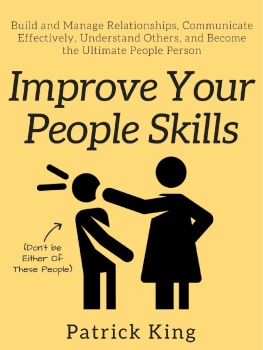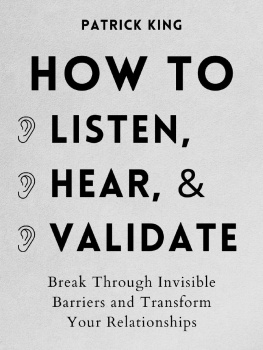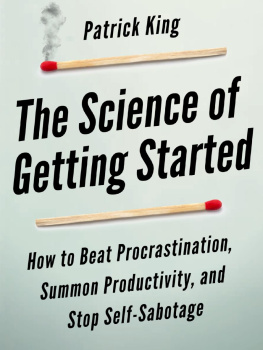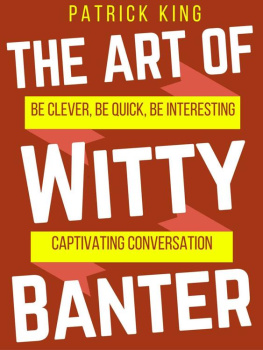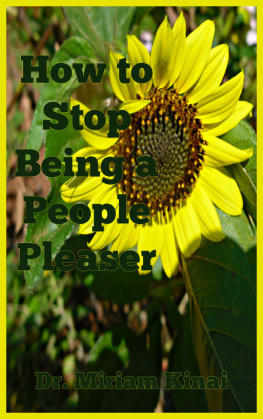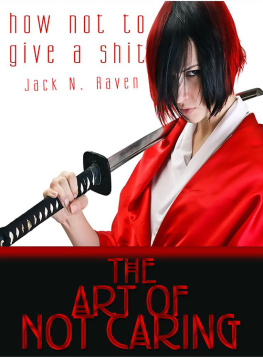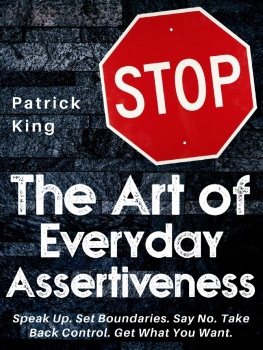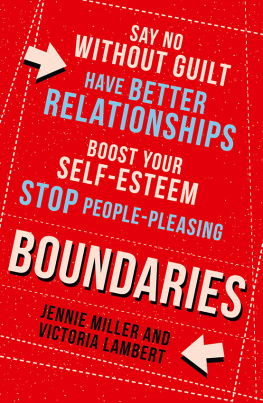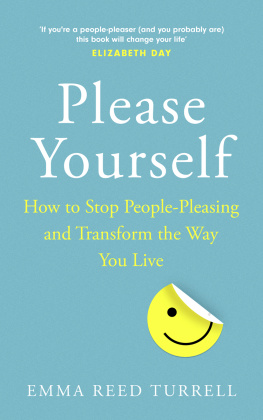Chapter 1: The Fatal Need to Please

I once had a friend named Muriel. She worked at a large technology company. She was in a middle-management position, which large technology companies cant seem to get enough of.
Muriel was well-respected because she seemed to be selfless and often took the burden of the entire office on her shoulders. She gladly accepted any piece of work her manager had, even if there were other people who could take care of it. In fact, sometimes Muriel took jobs from supervisors other than her own. Just trying to carry the load and help out, shed say.
Muriel had a habit of going above and beyond the call of duty. She worked hard to accommodate as many people as she knew. Shed take over presentations that cohorts were stuck on. She stayed late at least two nights a week. Maybe twice a month she would go out for lunch and offer to bring back sandwiches for her entire unit. Most of the time, she didnt ask to be paid back.
Her thinking was that she had to make herself an invaluable asset to the organization. This was particularly important to Muriel because she was terrified of being unemployedshed spent 22 months on unemployment, during which she thought nobody would ever hire her again. She figured that by working extra hard, other people in the office would consider her indispensable and could never replace her.
But somewhere along the way, Muriel turned that obsession into subconscious obedience. Not only did she want to make everyone around her satisfied and happy, but she also became utterly petrified of rocking the boat in any way.
Muriel worked in the marketing department. Her job was to suggest and execute product packaging design elements that made her companys products look attractive. Shed studied art and graphic design in college and fully believed in the less-is-more principlethat you shouldnt overload a given product package with too much clutter, extraneous information, or bad imagery. The market trends overwhelmingly agreed with her, and so did the sales data.
Unfortunately, her managers loved all that stuff. They believed customers wanted to see every single piece of information they could possibly want right there on the box.
Muriel knew this wasnt true and wanted to say something about it. But she didnt. She was afraid of rocking the boat in any way. She couldnt lose her job. So she simply nodded in assent at design meetings and supported their decision to clutter the package of their new product with unappealing imagery, thorough but unreadable information, and a lousy-looking cartoon mascot rabbit that had nothing to do with the company or the product.
The product failed for more reasons than just the packaging, but it didnt help. Either way, Muriel thought shed done and worked hard enough to merit her staying in her job, because shed striven to make everyone happy.
But when layoffs started two months after the product died, Muriel was the first to be let go. She was mortified. She felt that she had done everything right and made herself irreplaceable to the company. When she asked why, the human resources department said she hadnt done enough to distinguish herself as a vital contributor to the company. She didnt seem to have any ideas to move the company forward and appeared to be content just to keep the office in order.
Muriel descended into full-on panic mode. What had happened was the exact opposite of what she believed: keep your head down, work hard, and youll get properly rewarded. She wanted everyone she worked with to feel happy and supported, but she somehow got punished for it.
What was the cause of Muriels downfall? She was focused on pleasing others and gaining their approval and put her actual job priorities second. She wasnt doing what she was hired to and was only acting to prevent feelings of rejection. In hindsight, its no surprise what happened to her.
Muriel was, in short, a people-pleaser and a stark illustration of how self-defeating people-pleasing can be.
What Is People-Pleasing?
Generosity and friendliness are excellent qualities to possess. They help communication and cooperation between people. Theyre necessary in order for societies to get along. In almost every scenario, they beat the alternatives of selfishness and hostility. These are traits that are beaten into our heads from childhood for good reason.
But dont confuse people-pleasing as generosity and friendliness. They may appear identical from the outside, but what drives a generous person versus a people-pleaser couldnt be more different.
A people-pleaser is kind to a fault, as you can see from Muriels example. The drive for their kindness is not that its just the right way to be or that they want to enrich peoples lives. Instead of coming from a sincere desire to make the world a better place, people-pleasing stems from insecurity, fear, and shame.
A people-pleaser is worried about rejection. They have a need, as we all do, to be accepted and treasuredto be loved. But in people-pleasers, this need is amplified to the extent that they will bend over backward just to not lose that love or acceptance. They are driven by avoiding negative consequences rather than creating positive possibilities. Additionally, they feel that they are always on the brink of rejection, so this urgency causes a type of panic that is characterized by doing anything possible. People-pleasing is a defensive act, whereas genuine concern and generosity are affirmative practices.
The people-pleaser at the same time also seeks approval, because approval is the sign that there has been no rejection. This is why they will jump through hoops for a simple smile and thank you. These elements taken together create someone who feels that they must always be serving others in order to be accepted. Some specific impulses are detailed belowhow familiar do they sound to you?
People-pleasers are always cheerful in all situationson the outside. A people-pleaser never complains about anything. They have no apparent negative feelings. They have a smile on their face every moment theyre awakeat least when others are observing. They think theyre doing so to make everyone around them feel happy when, in fact, their sunshiney behavior is probably making those people uneasy. They are more transparent than they realize, and being around someone who is obviously putting a false face on is off-putting and uncomfortable. At best, it seems dishonest; at worst, its manipulative.
People-pleasers never assert what they think, believe, or wanteven if they are unhappy. With people-pleasers, its all about everyone else. If theyre going out with someone, theyll never recommend what to do or where to go. Theyll never speak up if theyre having a terrible time. They dont want to ever be the reason for unhappiness or dissatisfaction. Theyll simply agree with the general sentiment of the group rather than risk rejection or being an outcast. They feel, whether accurately or not, that they are fine with everything. This allows resentment to build little by little over time until they are a volcano waiting to erupt.


